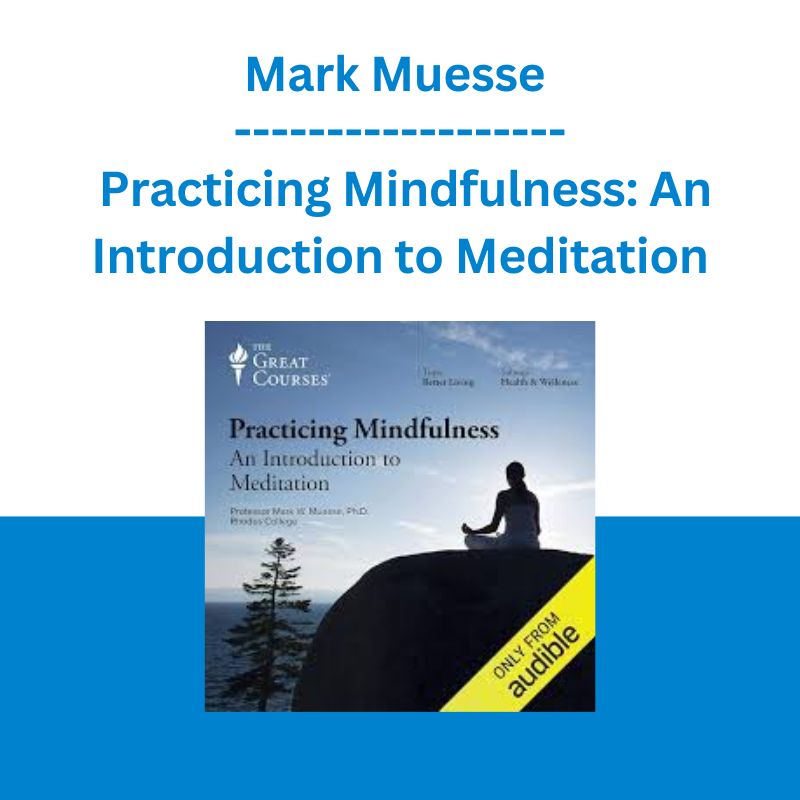*** Proof of Product ***

Exploring the Essential Features of “Mark Muesse – Practicing Mindfulness: An Introduction to Meditation”
Practicing Mindfulness: An Introduction to Meditation
Learn the principles and techniques of meditation and enjoy the deep and lasting benefits of this ancient practice on your mind and body.
LESSON (24)
01:Mindlessness-The Default Setting
Do you control your mind, or does your mind control you? Investigate how the mind operates and the condition of “mindlessness”-the pervasive swirl of thoughts and judgments that separate you from the world around you. Consider the possibility of cultivating the mind in ways conducive to deep well-being for yourself and others.
02:Mindfulness-The Power of Awareness
Explore the notion of “mindfulness”-nonjudgmental attention to experience-as it occurs in everyday life and as a deliberate practice. Note the many benefits of mindfulness practice, from the freedom to choose how you respond to life, to releasing detrimental emotions and patterns of thinking, to its effects on your physical health.
03:Expectations-Relinquishing Preconceptions
This lecture introduces the practice of meditation as a tool for developing mindfulness. Here, distinguish the true nature of mindfulness meditation from common preconceptions about it, revealing its capacity to instill a deeper connection to reality, as well as cultivating a wisdom based in empathy and compassion.
04:Preparation-Taking Moral Inventory
In approaching meditation, consider the interconnections of ethical behavior with the development of mindfulness and the shaping of personal character. Drawing from the Buddha’s teachings, explore five precepts of behavior that are conducive to the greatest benefits of meditation practice, based in the fundamental principle of not harming others or yourself.
05:Position-Where to Be for Meditation
Now learn about the most beneficial physical conditions for your meditation. First, consider the time of day and the physical setting that will best serve your practice. Then, study the most effective sitting postures on the floor, cushions, or chair and the optimum alignment of the body for mindfulness meditation.
06:Breathing-Finding a Focus for Attention
Mindfulness meditation is based in the use of an anchor or focus of attention, allowing the mind to calm itself. Using your breathing as the focus, learn in detail about the fundamental elements of sitting meditation, focusing attention on the breath and returning to it when the mind strays, without judgment.
07:Problems-Stepping-Stones to Mindfulness
Here, explore difficulties often encountered in meditation and ways of working with them that are also useful in the larger context of living. Consider physical discomfort and the specific use of mindfulness itself in working through it. Look also at ways to strengthen concentration and to counter frustration and discouragement.
08:Body-Attending to Our Physical Natures
Building on your work with mindfulness practice, learn another technique that augments and supports meditation. The “body scan” directs focused attention to different areas of the body, promoting deeper sensory awareness, relaxation, and concentration. With Professor Muesse’s guidance, experience a 20-minute body scan meditation, a fundamental practice of self-compassion.
09:Mind-Working with Thoughts
The mindfulness tradition has much to say on the nature of thoughts and their power to shape personality and character. Here, learn specific ways to identify detrimental thoughts and a variety of methods to work with them, demonstrating that you can influence the conditioned mind through conscious and deliberate response to your own thoughts.
10:Walking-Mindfulness While Moving
Walking meditation, another core element of the mindfulness tradition, allows you to practice mindfulness wherever and whenever you go. Learn walking meditation in detail, including beneficial conditions for practice, the method of mindful walking, where to focus your attention, and advanced variations on the practice.
11:Consuming-Watching What You Eat
When approached with mindfulness, eating offers heightened awareness and undiscovered depth of experience. This lecture takes you on a rich exploration of mindful eating, beginning with an eating “meditation,” using all five senses. Then contemplate mindful eating in daily life and detailed suggestions for sharing a fully mindful meal with others.
12:Driving-Staying Awake at the Wheel
As a familiar and potentially hazardous activity, driving provides a perfect “laboratory” for practicing mindfulness. Assess your own approach to driving and bring the principles of meditation to bear on the road; in particular, giving focused attention to the present moment, to your sensory experience and emotions.
13:Insight-Clearing the Mind
Practicing mindfulness over time prepares the mind for “insight,” which in this tradition means seeing clearly into the fundamental nature of reality. Begin an inquiry into what Buddhism calls the three “marks” of existence with the notion of impermanence-the eternal arising and passing away of all phenomena.
14:Wisdom-Seeing the World as It Is
Now investigate dukkha, the insatiable quality of human experience-seen in our endless pursuit of the symbols of well-being and achievement and avoidance of unwanted experience. Finally, contemplate not-self-penetrating the illusion of the “I” as an entity separate from the rest of reality, which must be bolstered, protected, and satisfied.
15:Compassion-Expressing Fundamental Kindness
With relation to mindfulness practice, explore compassion-the desire to alleviate suffering-as an essential component of our nature as human beings. See how compassion allows us to look at suffering without aversion or attachment, and learn specific practices for developing empathy and deeply recognizing the inner experience of others.
16:Imperfection-Embracing Our Flaws
Finding compassion for ourselves is greatly challenging for many of us. Consider the complex of beliefs, attitudes, and conditioning that underlie this; in particular, the thorny phenomenon of perfectionism. Learn how to embrace and accept both imperfection and perfectionism itself as an opening to freedom and deeper humanity.
17:Wishing-May All Beings Be Well and Happy
The mindfulness tradition offers an additional practice that is highly effective in revealing and cultivating compassion. With Professor Muesse’s guidance, experience metta meditation, a focused contemplation wishing well-being and peace for others. See how this practice works to relinquish alienation and hostility and to deepen solidarity with all humanity.
18:Generosity-The Joy of Giving
Here, study the mindfulness tradition’s insights concerning attachment to “things,” our culture’s dominant emphasis on possessions, and the psychological roots of greed. Learn about the Buddhist tradition of dana (sharing with others) and specific practices that reveal the life-giving effects of generosity on the giver and receiver.
19:Speech-Training the Tongue
Mindfulness practice brings focus to the critical link between speech and behavior. Consider the ways in which both inner experience and outward action are influenced by our use of language. Reflecting on four Buddhist principles of skillful communication, explore mindful attention to speaking and the use of language in genuinely beneficial ways.
20:Anger-Cooling the Fires of Irritation
This lecture discusses the challenges of dealing with anger and ways to disarm it using the skills you’ve studied. Reflect on our cultural predisposition to either suppress anger or to express it thoughtlessly, and a third way offered by mindfulness, of nonjudgmental observation, acceptance, and the mental spaciousness to choose your response.
21:Pain-Embracing Physical Discomfort
The skills of mindfulness offer powerful means to work with physical discomfort of all kinds. Consider the crucial distinction between pain and suffering as it directly affects our perceptions. Then experience two meditations for alleviating physical suffering-first, focusing on observing the exact sensation itself, then, on your response to the sensation.
22:Grief-Learning to Accept Loss
In reflecting on the universality of loss, take a deeper look at the notion of impermanence and how refusal to embrace life’s transience affects our experience of living. Learn how mindfulness approaches grief through centering focus in the present moment and fully experiencing what grief brings to us without fear or aversion.
23:Finitude-Living in the Face of Death
The mindfulness tradition considers reflecting on death to be both liberating and essential to living a full and satisfying life. Contemplate the ways in which our culture conditions us to avoid and deny death, and learn four meditations that deepen both the awareness of life’s transience and our ability to live freely.
24:Life-Putting It All in Perspective
Finally, consider various possibilities for continuing your practice through the methods you’ve learned, further study, and retreats. Professor Muesse concludes with reflections on his own path and on the very real capacity of mindfulness practice to profoundly alter our perceptions of self, the world, and our place in it.
DETAILS
Overview
Learn how to better live in harmony with the realities of the world and to feel more deeply connected to the whole of life with Practicing Mindfulness: An Introduction to Meditation. In these 24 lectures, award-winning Professor Mark W. Muesse gives you a clear and usable understanding of the essence of meditation and how to practice it. You’ll learn the principles and techniques of sitting meditation; the related practice of walking meditation; the highly beneficial use of meditative awareness in activities such as eating and driving; and much more.
About
Mark W. Muesse
“Mindfulness allows us to become keen observers of ourselves and gradually transform the way our minds operate.”
ALMA MATER Harvard University
INSTITUTION Rhodes College
Dr. Mark W. Muesse is W. J. Millard Professor of Religious Studies, Director of the Asian Studies Program, and Director of the Life: Then and Now Program at Rhodes College in Memphis, Tennessee. He earned a B.A., summa cum laude, in English Literature from Baylor University and a Master of Theological Studies, a Master of Arts, and a Ph.D. in the Study of Religion from Harvard University. Before taking his position at Rhodes, Professor Muesse held positions at Harvard College, Harvard Divinity School, and the University of Southern Maine, where he served as Associate Dean of the College of Arts and Sciences. He is a recipient of the 2008 Clarence Day Award for Outstanding Teaching, Rhodes College’s highest faculty honor. Known for his experiential teaching style, Professor Muesse was honored for his effective use of imaginative and creative pedagogy as well as his ability to motivate his students toward lifelong study. Professor Muesse has written many articles, papers, and reviews in world religions, spirituality, theology, and gender studies and has coedited a collection of essays titled Redeeming Men: Religion and Masculinities. He is currently compiling an anthology of prayers from around the world. Professor Muesse is a member of the American Academy of Religion and the Society for Indian Philosophy and Religion and has been Visiting Professor at the Tamilnadu Theological Seminary in Madurai, India. He has traveled extensively throughout Asia and has studied at Wat Mahadhatu, Bangkok, Thailand; the Himalayan Yogic Institute, Kathmandu, Nepal; the Subodhi Institute of Integral Education, Sri Lanka; and Middle East Technical University, Ankara, Turkey.
Please see the full list of alternative group-buy courses available here: https://lunacourse.com/shop/










 George Fontanills & Tom Gentile - Optionetics Wealth Without Worry Course
George Fontanills & Tom Gentile - Optionetics Wealth Without Worry Course